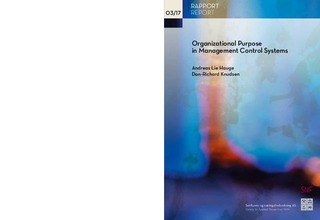| dc.description.abstract | The aim of this thesis is to contribute with new insights on the concept of organizational purpose, by answering the following main research question:
How does purpose influence the MCS in purpose-driven organizations?
There has been a tremendous increase in the general interest of organizational purpose over the course of the last decade. However, there is still a significant lack of scholarly research conducted on the concept. In this thesis, we seek to gain an enhanced understanding of what organizational purpose is, how it may be operationalized in organizations’ management control systems (MCS), and the potential implications for employees. We seek to understand what organizational purpose is by reviewing the existing management literature on organizational purpose. Furthermore, we conduct a comparative analysis of how the concept is operationalized in the MCS of two Norwegian purpose-driven organizations. The analysis is based on qualitative data gathered from interviewing employees in these organizations.
In answering our main research question, we find that there are three important aspects in which organizations with a desire to become purpose-driven need to consider. First, we find that operationalizing purpose in an organization’s MCS is a laborious process. This implies that perseverance is a key factor. Second, our results suggest that organizational purpose must be operationalized in ways that are tangible for employees. The purpose should be articulated as an explicit statement, and should be operationalized in the MCS in ways that are understandable to employees. Third, we find that organizational purpose has the ability to spur organizational commitment and employee engagement. Potential consequences for organizations may be reduced turnover, higher level of innovation, and enhanced employee performance. However, our findings suggest that organizations may face a challenge in making employees’ commitment to the purpose cascade from upper management down to lower hierarchical levels. | nb_NO |
